July 4, 2025 – INEB Day 9, Reflection Presentations, Friday Dharma Q&A
Hello. Today is the 9th and final day of the INEB Study Tour. In the morning, participants wrote reflections and then presented them. In the afternoon, they had additional discussions on the theme of “How can we collaborate with each other?” before concluding the INEB Study Tour.
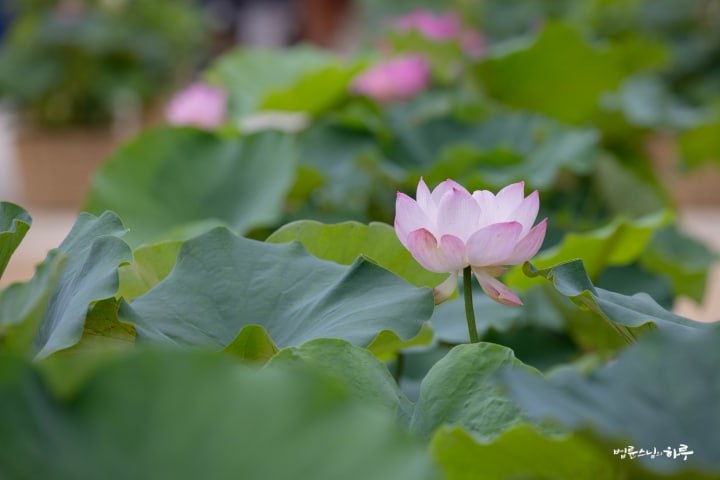
After completing his morning practice and meditation, Sunim headed to the Jungto Social and Cultural Center. The 9th day of the INEB Study Tour began at 8:30 AM in the auditorium on the 9th floor.
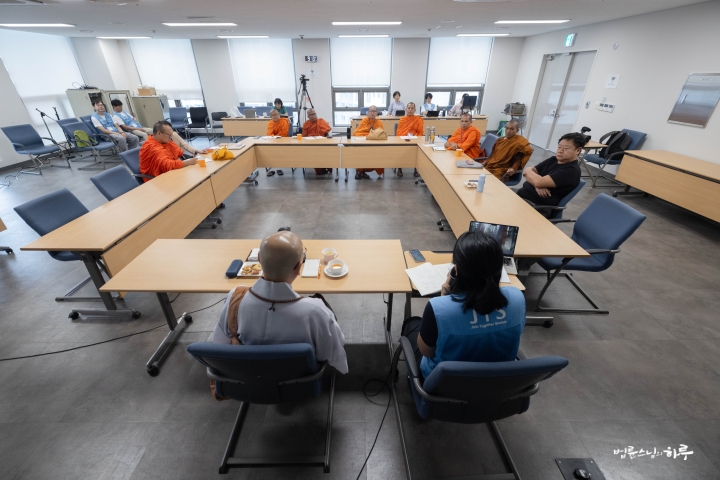
“Did you sleep well?”
“Yes.”
Continuing from yesterday, the dialogue proceeded on the theme of “How can we collaborate with each other?” Venerable Sovichia from Cambodia shared his major project plans for the next three years. Since becoming a novice monk in 1993, Venerable Sovichia has dedicated himself to education to overcome the deep suffering and poverty in Cambodian society. His presentation focused on education and community development.
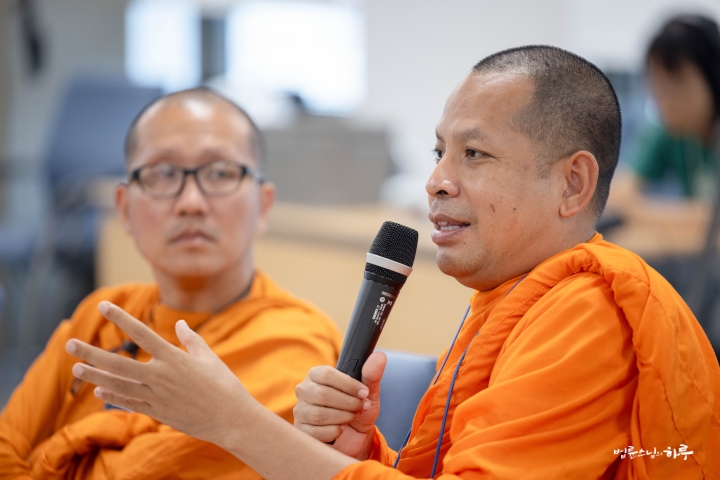
“Education is the only way to change people’s consciousness and transform society. First, educating girls is currently our priority. We plan to purchase land near the school to expand dormitories for female students, and we are already discussing land purchase contracts. Second, the quality of teachers and staff determines the quality of education. We aim to improve educational quality by collaborating with domestic and international organizations that can provide technical support. Third, we are looking for land for long-term use, considering about 2 hectares. This is an essential foundation for expanding the university’s activities. Fourth, if we can build high schools in rural areas, students won’t have to give up their studies. While there are many middle schools, high schools are far away, making it particularly difficult for female students to continue their education.”
After Venerable Sovichia’s presentation, Sunim suggested specific ways to ensure long-term sustainability.
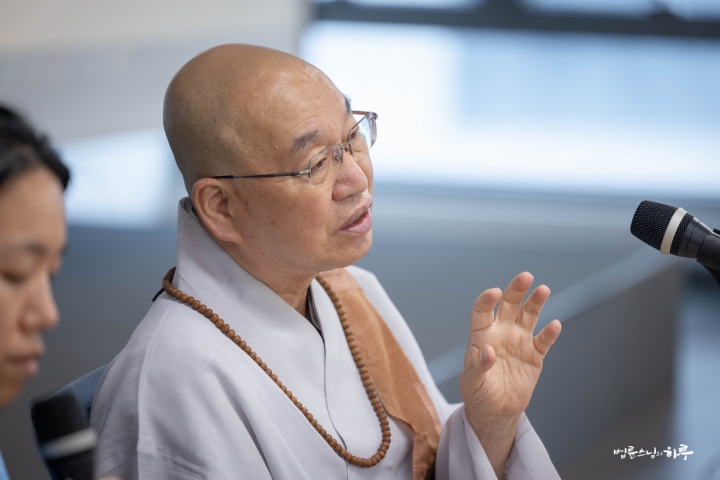
“A sustainable development plan is needed. How about operating the dormitory exclusively for nuns (female monastics) rather than for general female students? If students spend their four years as nuns, there would be less family opposition, and some of the educated women could remain in community activities and grow as leaders. To change society, we must continuously cultivate leaders. Simply providing education is not enough; we need a structure that develops people who will become agents of change.
When many people participate even in small ways, we can secure greater scalability and sustainability. For securing university land, a ‘buy one square meter of land’ campaign could encourage community belonging and participation. High school construction is possible through an MOU between the school, local government, residents, and JTS. The school would be responsible for construction, the local government for technician wages, residents for volunteer work, and JTS for construction materials.”
They concluded the dialogue by agreeing to continue working together so that young people in Cambodia can dream of a better future.
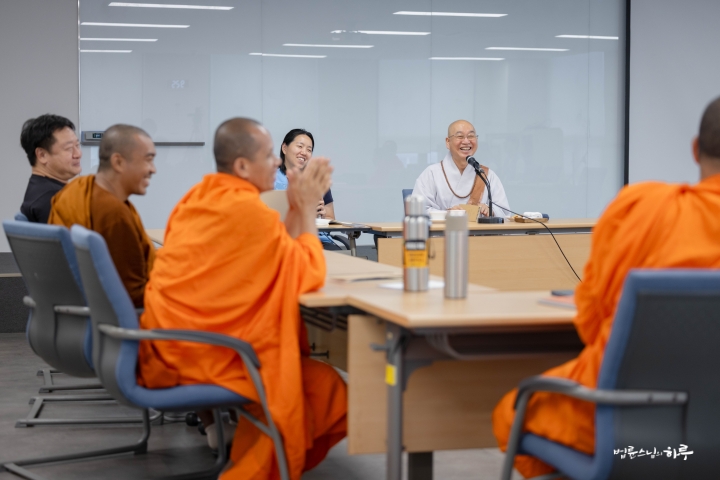
After a short break, participants had time to write their reflections. The INEB participant monks reflected on their nine-day journey and carefully wrote down their accumulated thoughts and feelings on white paper.
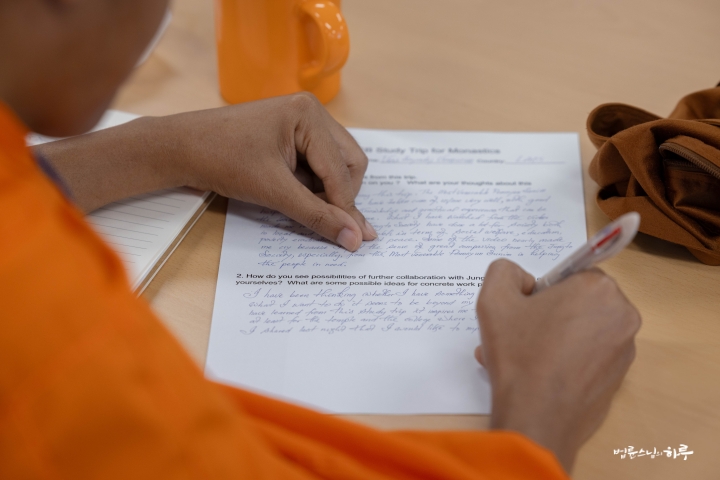
After completing their reflections, they began presenting them at 10:30 AM. Venerable Dhammananda from Sri Lanka started the presentations.
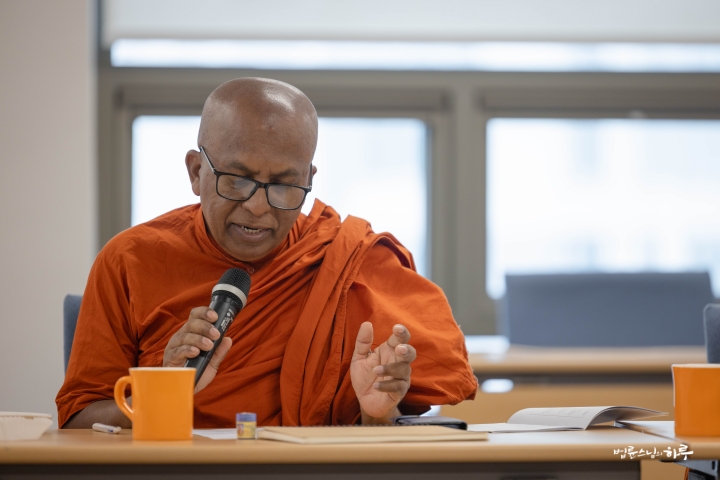
“During this study tour, I had the opportunity to be close to an excellent role model, Venerable Pomnyun Sunim. I am deeply grateful to Jungto Society and INEB for this opportunity. The experience at Silsangsa Temple was incredibly intense. I felt deep respect seeing how Venerable Dobup, who was the abbot of a traditional temple, let go of conventional respect to create an equal community and society. We must cooperate and work together in the future. I propose creating a network where we can support and share each other’s work.”
Venerable Kongsin from Thailand said he was deeply moved by Jungto Society’s efficient operating methods.
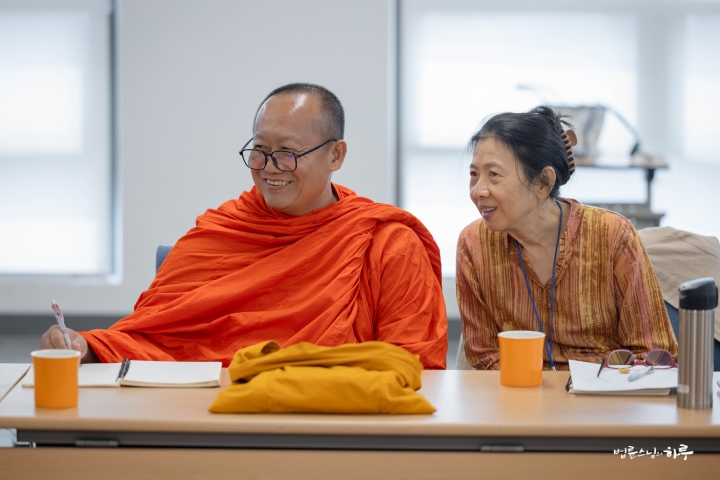
“Jungto Society is a community based on trust and mutual respect. I was particularly impressed by the emphasis on efficiency in their working methods. This experience has inspired me not only to work with clearer goals and results but also to be more diligent in my personal practice and journey of enlightenment.”
Venerable Sayadeji from Laos was deeply moved by the various activity videos produced by Jungto Society and was inspired to do something for his own organization.
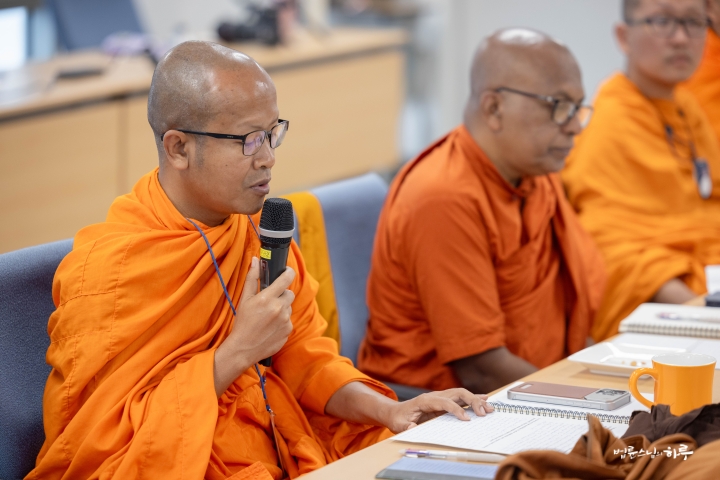
“The various videos shown by Jungto Society moved me to tears. I could feel the deep compassion that Venerable Pomnyun showed in the videos. It made me think a lot about what I could participate in. Sometimes what I want to do seems beyond my capabilities. But what I learned from this INEB Study Tour is that I must at least do something for the temple and community I serve.”
Venerable Pokpan from Cambodia emphasized the importance of dedicated efforts for society and mutual cooperation.
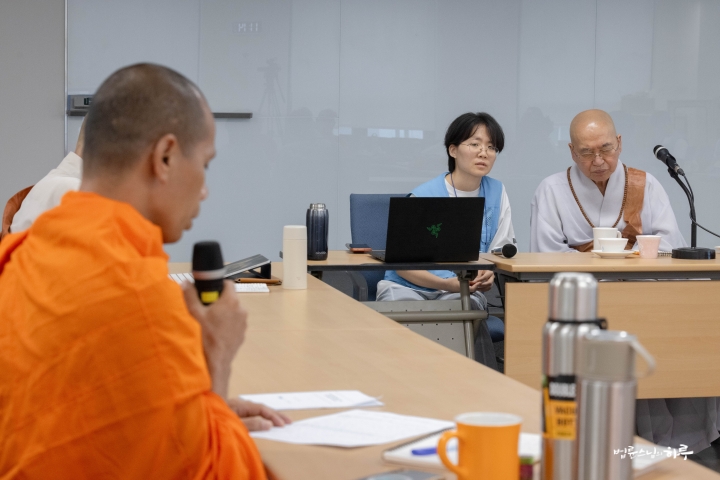
“This experience gave me the courage to dedicate myself more to work for society. I also gained critical thinking and creative ideas to develop my community.”
Venerable Prawin from Thailand mentioned the need for international cooperation on environmental issues, particularly forest restoration.
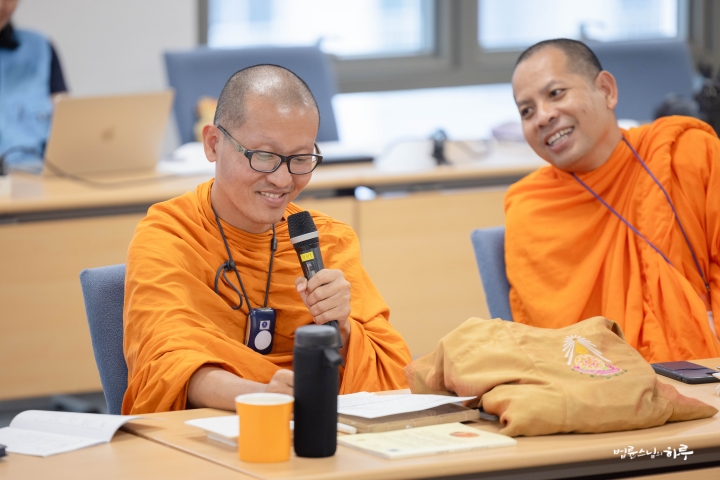
“I was deeply impressed by Venerable Pomnyun Sunim’s way of working, and I could understand his philosophy of not just maintaining material achievements but protecting something beyond that. I gained many ideas about how to pursue international cooperation to solve environmental problems.”
As they were presenting reflections, it was time for lunch. The monks from Southeast Asia must follow the precept of not eating after noon, so they needed to eat before 12 PM. They decided to continue the reflection presentations after lunch and moved together to the dining hall in the basement.
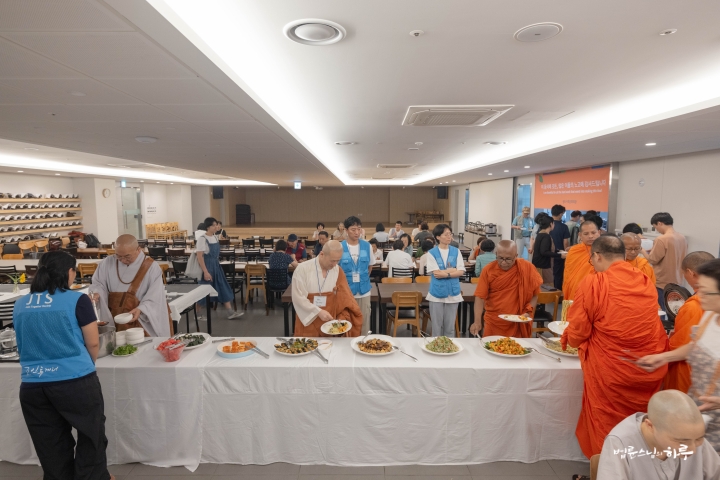
“Today’s lunch is our final farewell banquet. Please enjoy your meal.”
The INEB participant monks began their meal after offering a prayer of gratitude in the Theravada tradition.
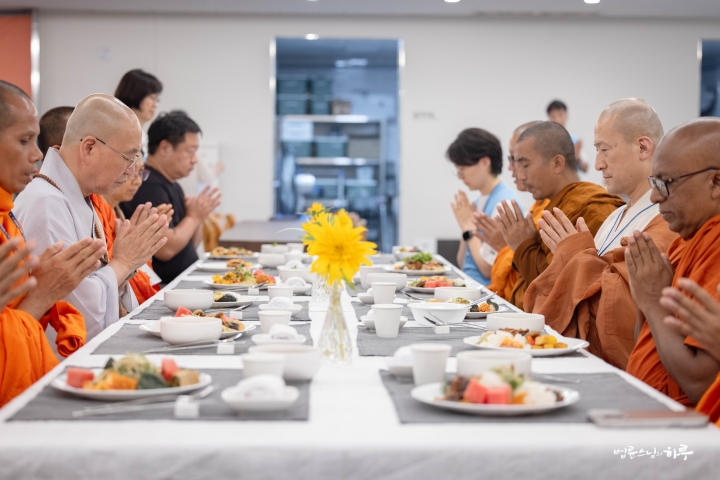
After finishing the meal and having conversations, they continued the reflection presentations from 1:30 PM.
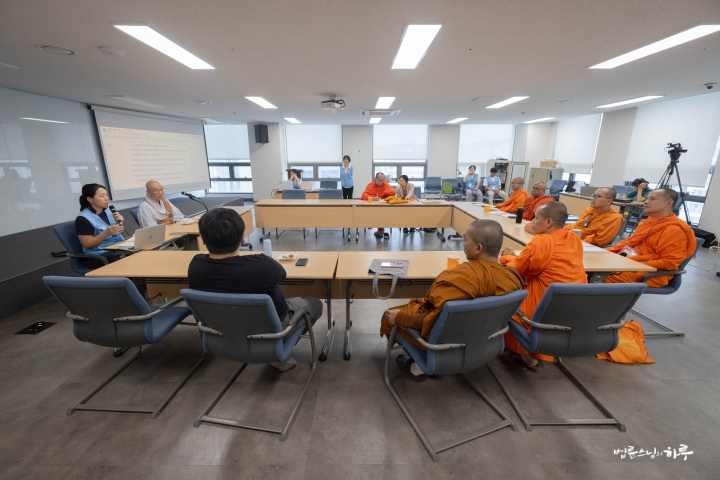
Venerable Sovichia from Cambodia said he learned about Korea’s engaged Buddhism and Jungto Society’s systematic operations.
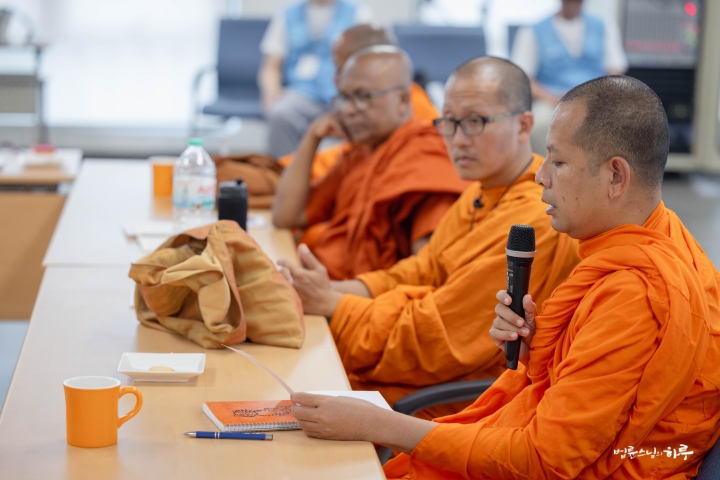
“Jungto Society volunteers are very kind, open-minded, and have a strong sense of responsibility for their work. I was able to learn a lot about the engaged Buddhism that Jungto Society is practicing here.”
Venerable Kittisara from Myanmar was deeply moved by the harmonious community cooperation.
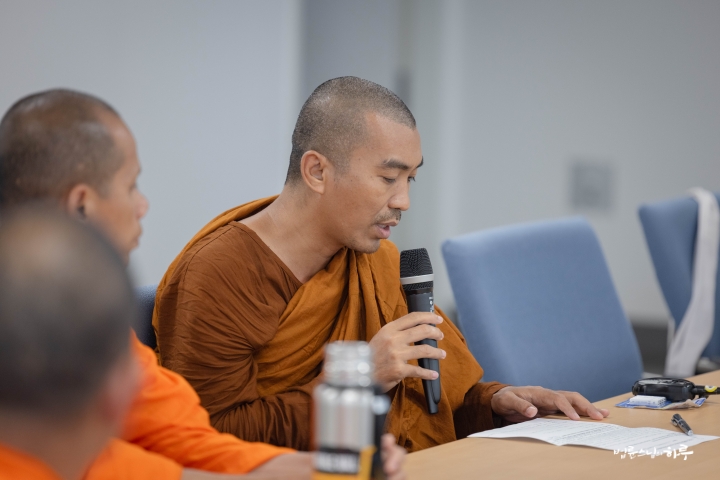
“I was deeply moved to learn that Jungto Society is a very thoughtful community. I learned how to work together, live together, and cooperate harmoniously.”
Finally, Sunim also shared his reflections.
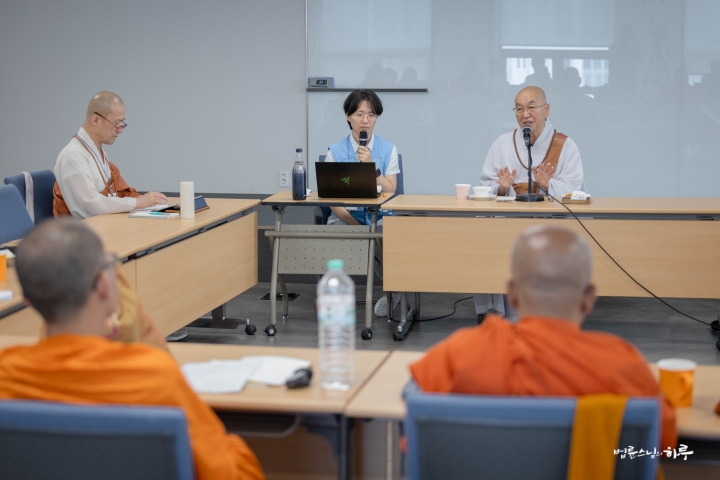
“Through this opportunity, I came to understand well what you are doing, what concerns you have, and what you lack. However, it leaves something to be desired. I felt that your activities seem to lack social engagement beyond Buddhism. Nevertheless, I could feel that you are seriously thinking and working hard in your own ways about what role Buddhism can play in local communities.
I Am Proud of You for Continuing Buddhism’s Social Role
The reality is that many monks forget their duty as monastics and pursue personal comfort through the Three Jewels’ offerings (三寶淨財). In this context, I was deeply moved that you are living dedicatedly for yourselves and those around you. Today, many Sangha members are often preoccupied with just living comfortably by themselves. But you are trying to do something by attempting new education or practicing environmental movements in your communities. I felt so proud of that. Of course, though you didn’t say it outwardly, I think there must have been many times when you thought inwardly, ‘Do I really have to do this? I want to quit.’
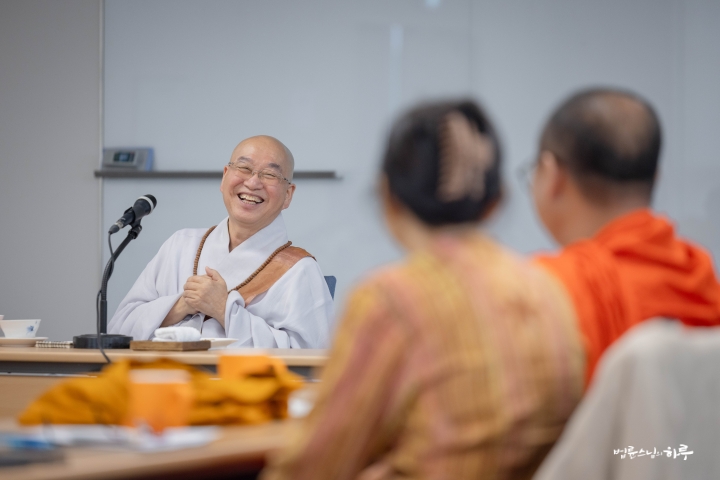
Our seniors – Dr. Sulak Sivaraksa, His Holiness the Dalai Lama, Thich Nhat Hanh, Venerable Ghosananda, and Dr. Ariyaratne – have shown us how to participate in social issues according to Buddhist teachings since half a century ago. However, they have now passed away or become too old to be active. How to continue their legacy seems to be INEB’s major challenge today.
Another challenge is not just inheriting their legacy, but how to expand and develop it further. Until now, INEB has simply connected individual activists, but in the future, we should also explore ways to collaborate jointly. I hope you will take central roles in your countries amid these changes. In this study tour program, we could feel closer because we discussed specific tasks together. Thank you for your enthusiastic participation.”
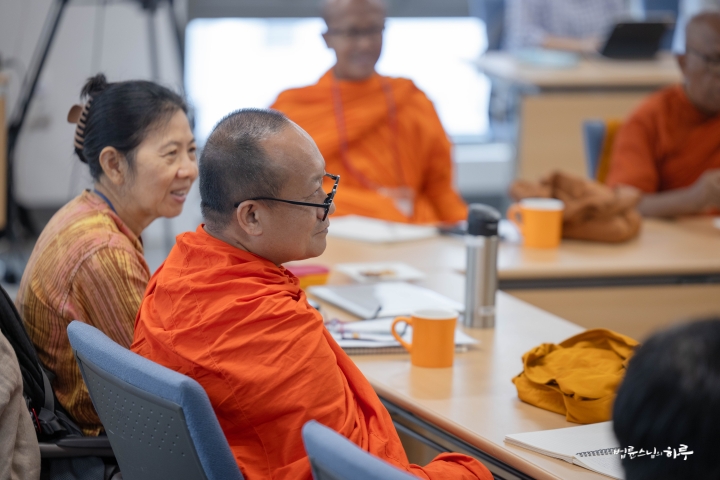
After all the participants finished presenting their reflections, Sunim continued the discussion.
Jungto Society Is Not a Fourfold Assembly but a Single Assembly
“Before the Buddha became a practitioner through renunciation, he was a prince of a kingdom. When he lived as a prince, he had many servants, but after renunciation, he no longer kept servants. The Buddha became Dharma friends with all practitioners he met, regardless of their status or position. The members of the Sangha also formed equal relationships as Dharma friends, not hierarchical ones. Even if they had been in master-servant relationships before renunciation, they all became friends after becoming practitioners. That’s why I believe we should maintain this equality as much as possible. When relationships are formed incorrectly, they can easily become hierarchical. The members of Jungto Society can be called not a fourfold assembly (四部大衆) but a single assembly (一部大衆). We don’t divide and categorize people as men, women, monastics, or lay practitioners – we are simply one assembly.
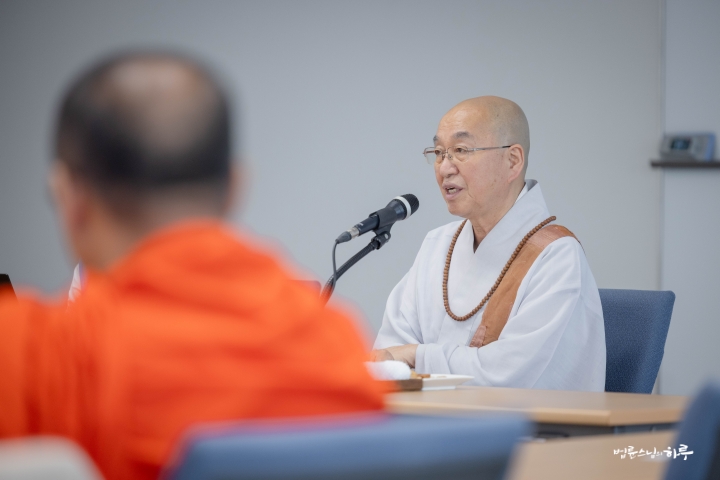
When doing relief work in poor countries, it’s easy to form hierarchical relationships by dividing into ‘those who help’ and ‘those who receive help.’ Although local people call me ‘monk,’ they actually treat me more as ‘someone who gives help’ rather than as a monk. In such situations, it’s difficult to have equal relationships. However, I try to create equal relationships as much as possible. The concept is not a ‘relationship of giving and receiving help’ but a ‘relationship of dividing work and cooperating together.’ This is why we named our organization ‘Join Together Society (JTS).’
Beyond a Helping Relationship, Toward a Path of Working Together
Another point I always keep in mind is that support can sometimes harm self-reliance. While support may seem helpful right now, in the long term, it could undermine self-reliance. Conversely, support can be provided in a way that fosters self-reliance. So I always consider what methods won’t harm self-reliance but rather cultivate it. From this perspective, after listening to your presentations today, I’d like to discuss together how and in what areas JTS can cooperate. I hope you’ll also share what kind of help you can provide for the self-reliance of those receiving assistance, and what kind of help you might receive from JTS.”
They continued the conversation on the topic of “how to cooperate with each other,” which they hadn’t fully discussed yesterday. Sunim emphasized JTS’s support principles and specifically discussed what kind of support JTS could provide based on what efforts each person could make in their own conditions and environments.
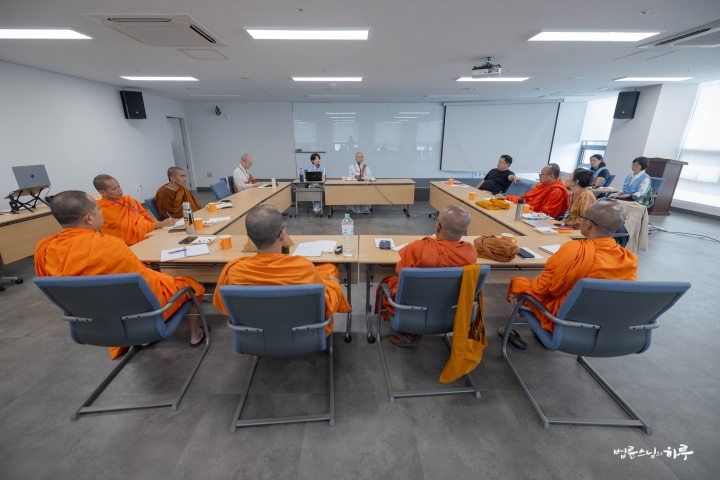
Venerable Kongsin from Thailand, who was considering various projects including Buddhist education, regional development, and agriculture, was full of enthusiasm but experiencing confusion due to lack of clear direction. Sunim offered advice on this.
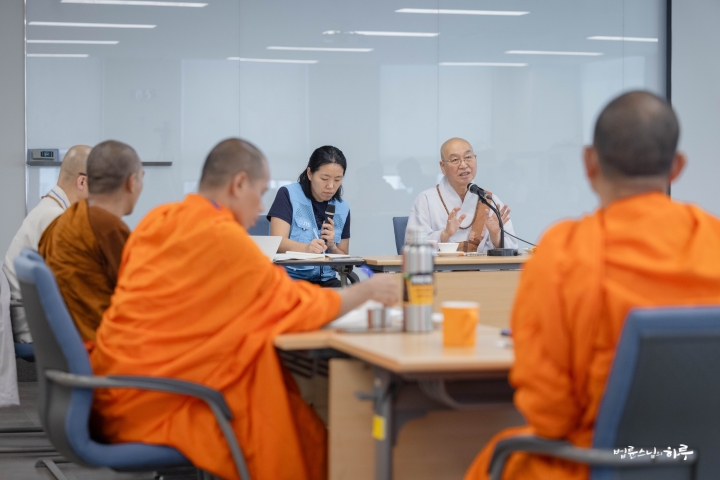
“If you’re interested in too many areas, implementation becomes difficult. If you want to run a Buddhist school well, help increase residents’ income, and help the elderly, trying to do all of this will eventually exhaust you. It’s important to choose what you can do best among these and establish specific goals and action plans.”
Venerable Sayadaw from Ongtu Sangha University in Laos, who leads Buddhist education, was struggling alone without support from the government or Sangha headquarters. Sunim also offered words on this.
“If you try to build, operate, and expand a school alone without government or Sangha support, there will be many limitations. You need to create a structure where you can receive funding or personnel support by establishing cooperative relationships with the Lao Buddhist Sangha headquarters or government agencies. Don’t do it alone – you need to create a system.”
Venerable Phokphan wanted to improve the deteriorating conditions of the Buddhist university buildings he was responsible for. However, he didn’t know where to start. Sunim said about this.
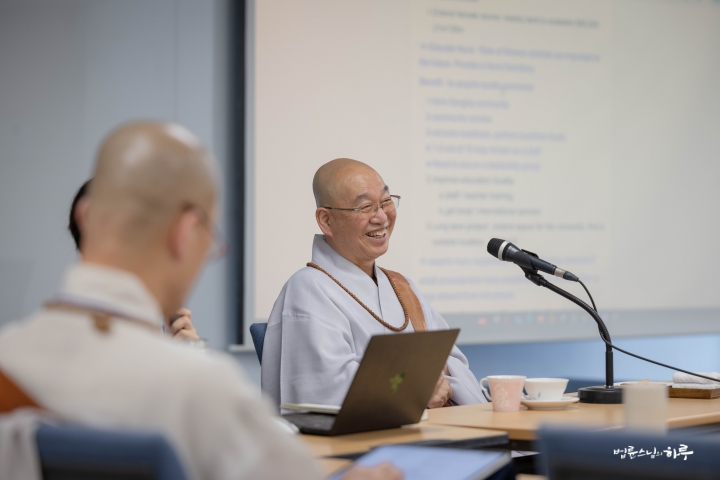
“Building one school building doesn’t improve education in that region. You need teachers and an operating system to maintain the school, and an environment must be created where children want to learn voluntarily.”
Venerable Prawin, who had an ambitious vision, was working to create a 1000-acre international Buddhist park. Sunim offered advice on this.
“You said you want to create an international Buddhist park, but first you need to listen to experts’ advice and make plans. People are more important than space. You need to gather people first, and those people should become the center to create the space.”
Venerable Dhammananda wanted to go beyond practice-centered education to create a practical education model suitable for modern society. Sunim said about this.
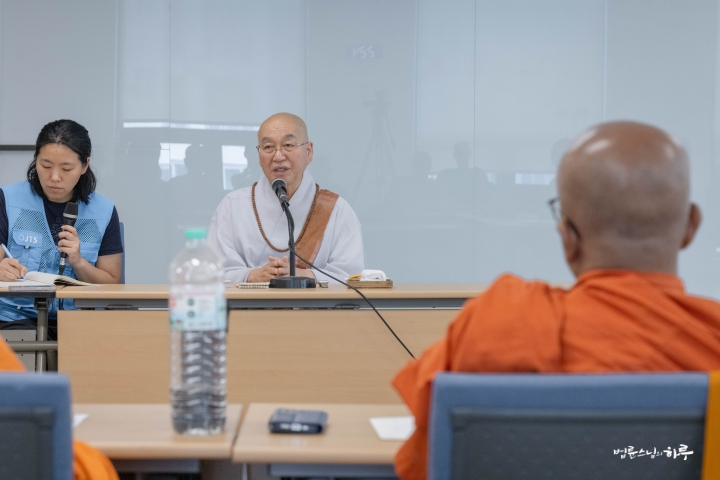
“First, you need to systematize the curriculum for education, implement it, and check the educational effects. If it’s effective, it can be expanded to other temples. You can also translate the content and share it with other countries. Jungto Society can help with such work.”
Venerable Kittisara from Myanmar, who was planning various activities, had many ideas but was deeply concerned about their feasibility. Sunim said about this.
“You have many good ideas, but if you try to do everything at once, you won’t be able to achieve even one properly. Set priorities and try implementing one or two things you really want to do first. You need to start with specific plans for budget, personnel, and time so that even if you fail, you can revise and move on to the next stage.”
After giving sincere advice to all participants, Sunim offered concluding remarks.
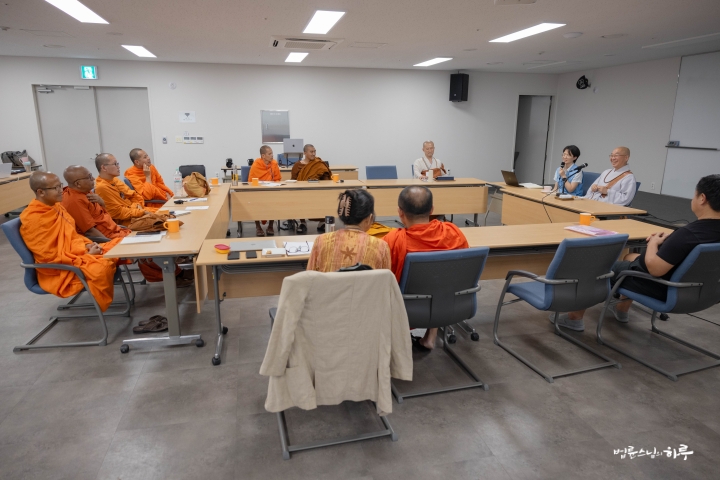
“More important than all the projects we discussed today is Buddha Dhamma. This is necessary for myself and for other people in this world. So our most important task is ‘how to help people apply Buddha Dhamma easily and correctly in their lives.’ Through this, we must give people hope to be free from suffering.
The Path of Practicing Buddha Dhamma in Daily Life
In the Buddha’s time, most practitioners renounced worldly life, formed a Sangha, and spread the Dharma together. In modern society, this approach isn’t easy. However, even without leaving home, anyone can use part of their life to spread this Dharma. Devotees who come to temples to pray for blessings seek their own benefit, so it’s difficult for them to become social activists. To be a bodhisattva, one must be able to generate even a little aspiration to ‘first become self-reliant and then help others.’ Only when such people gather can we play a role in leading social change. For this, individuals must first practice and receive proper education about the Dharma. Only an organization composed of such practitioners can spread the Dharma and engage in social practice to create a just society. We must work together in this way to make the world more just.
The Buddha started practicing alone with nothing and eventually became the first awakened person. In contrast, today we can start together with all of you and have at least minimal facilities. Compared to the Buddha, we have many things, so if we just generate the aspiration to ‘do it,’ there’s nothing we can’t accomplish. If we cooperate together, we can do much better. With this spirit, INEB (International Network of Engaged Buddhists) was founded, and we have come to meet like this. I hope we can continue to cooperate together in the future. Thank you for your hard work over this long time.”
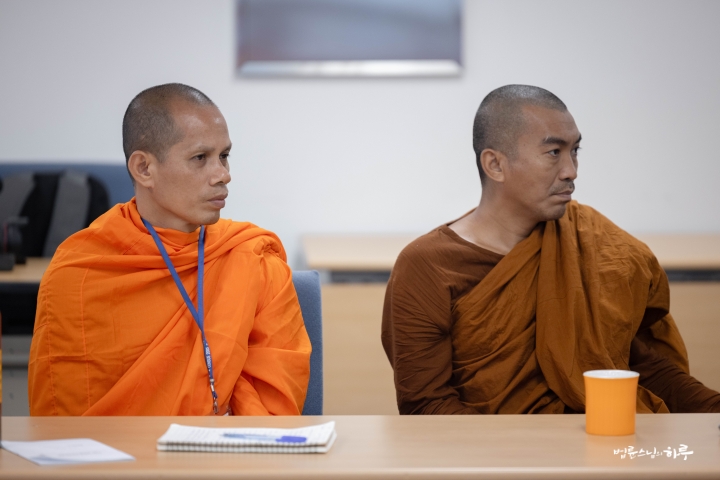
Sunim then encouraged the INEB participants to continue their activities steadily even after returning to their home countries, offering words of encouragement.
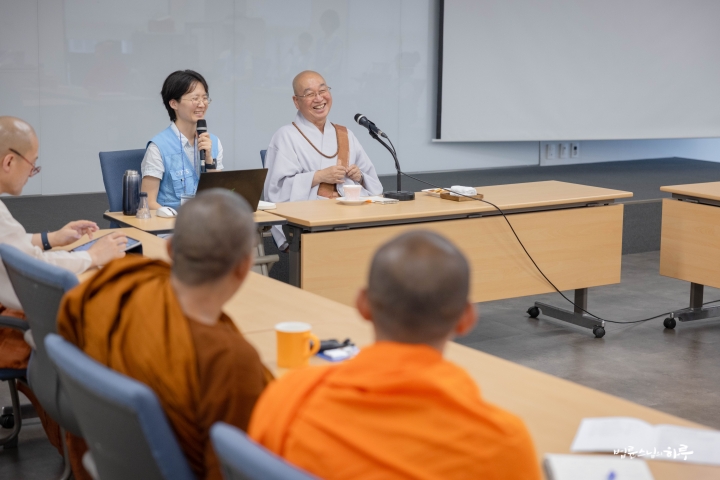
“Since I share such diverse stories with you, you might think I’m someone who has received a lot of education. But in fact, I have nothing special to boast about. I was born in the countryside, and my family’s financial situation was average for a rural area. I didn’t even finish high school, and I never attended a monastic college. I never studied abroad, nor did I receive any other special education. So I tell people this:
‘Compared to me, you are better in every way. You’re younger, you’ve received more education, and you have more resources, so there’s nothing that should be a problem for you in life.’
Since I entered the temple during high school, I don’t have many secular friends, and since I didn’t attend monastic college, I have very few monk friends either. I also don’t have a traditional temple foundation. My ordination master is a very distinguished person. Among his disciples, there are those who graduated from university and studied abroad, and some who have served as university presidents. But I never received any support from my ordination master. Even now, he tells me, ‘I’m sorry I couldn’t help you alone.’
Nothing Is Impossible, Just Keep Walking Steadily
However, I don’t think practice is only possible with someone’s help. Anyone can practice like me. I’ve never received financial support, nor have I ever enjoyed the authority of traditional Buddhism. Thinking that Buddhism shouldn’t be this way, I simply started a Buddhist movement with young people. At first, we rented a temple for our activities, but we were kicked out for doing ‘Minjung Buddhism’ (People’s Buddhism). In the social atmosphere of that time, if you worked for social justice, you were criticized for doing ‘Minjung Buddhism.’ Working with university students, we had no choice but to engage in social movements given the spirit of the times. While the students read social science books and participated in social movements, the only books I had read were Buddhist scriptures. However, I always had an interest in science because I wanted to become a scientist, and I was also very interested in history, so I read various books and studied on my own. That’s why I sometimes tell people, ‘I’m a quack.’ In Korean, a quack refers to someone who doesn’t have a medical license but is good at treating illnesses. In the sense of someone who hasn’t received formal education but actually performs well, I’m a quack in all fields. (Laughter)
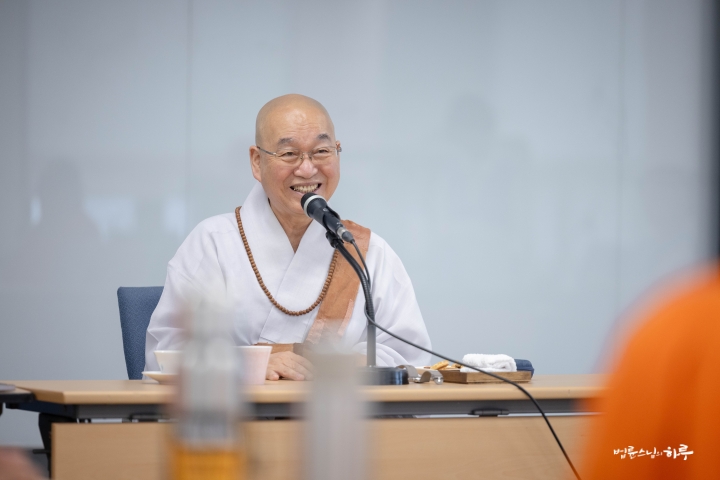
I am not here because I possess something special. I want to tell you that everything began in ordinariness. All I have encountered is the Buddha’s teachings. I didn’t come from a wealthy family, nor did I have any inheritance. From the beginning, I started with volunteer work alongside young people, and we have operated financially independent without anyone’s help. It took 14 years from opening our first office to securing our own building. During that time, we held fundraisers only twice. Once was to secure land, and once was to help our North Korean compatriots. At that time, I told people to donate even if it meant selling their homes, because many people in North Korea were dying of starvation. Apart from those occasions, we have never held separate fundraisers.
The many activities that Jungto Society undertakes today are not done because we have financial abundance. Even when resources are limited, we do not stop. For example, if we had tried to hire interpreters for this week-long program, we couldn’t have found anyone even if we offered a million won per day. Yet everyone is volunteering for free. Some interpreters even fly in from abroad at their own expense to help with translation, and drivers also volunteer their services. Jungto Society only provides meals for these volunteers. Thanks to them, we can accomplish so much together.
There is so much that can be done without being attached to money. That’s why I want to tell you not to think of it as too difficult, but rather that persistence is what matters. A monastic practitioner should not be driven by money. Just as when begging for alms, one should not demand food but only accept what is given, if we engage in social action with that same mindset, we can do anything. Once again, I thank all of you for being here with us. Finally, let me share some gifts with you.”
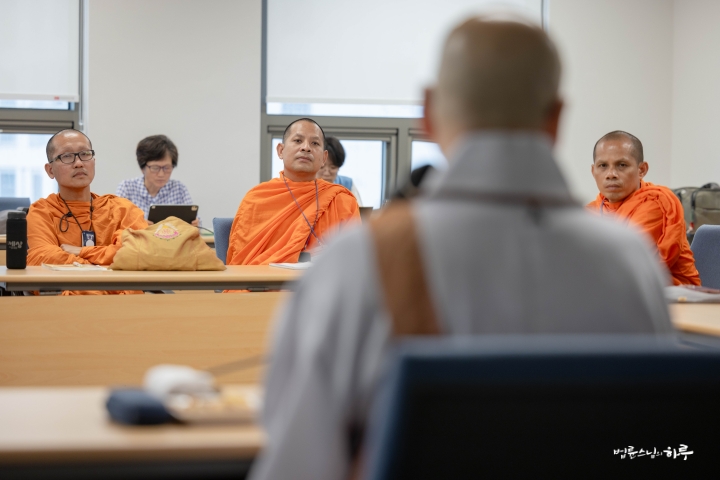
Sunim then asked Moo, the Secretary-General of INEB, for his thoughts. Moo shared that this journey had led him to make a new resolution.
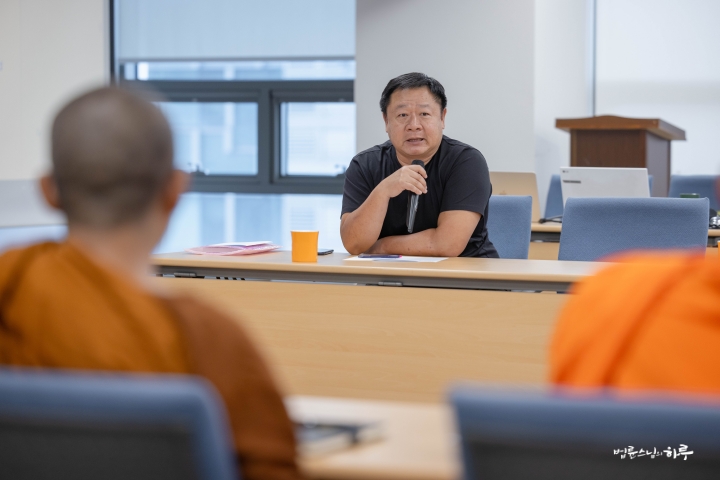
“Through this visit, I learned not just simple knowledge but also the spirit and energy contained within it. I now feel motivated not just to continue what I’ve been doing when I return, but to create something new myself.”
While the concerns of the monks from various countries were diverse, they all shared a common aspiration to create a better world. Sunim’s advice didn’t just point the way forward but guided each person to find a feasible path within their own circumstances. It was a time to realize that while no one is perfect, we can go a little further when we share our wisdom with one another.
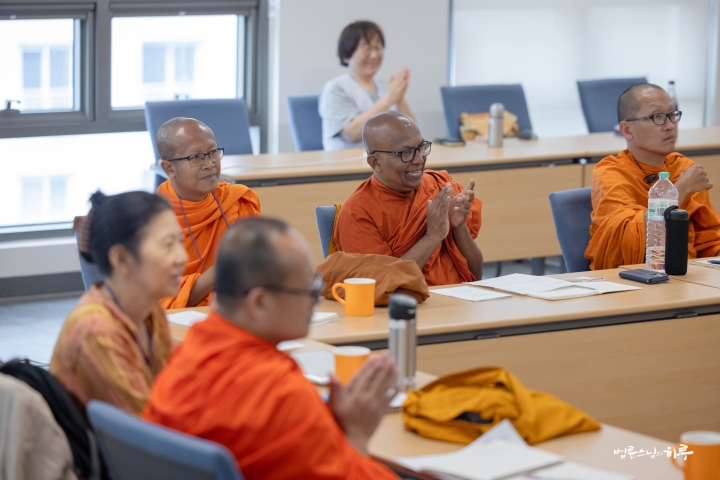
Sunim then presented gifts to the monks from various countries.
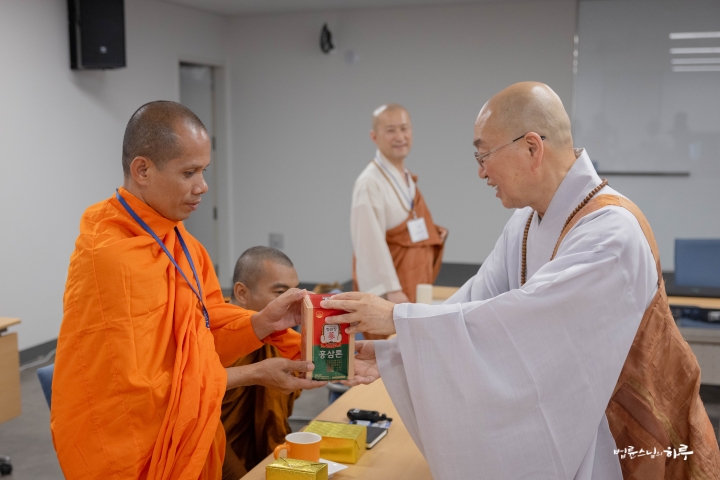
“I receive many lecture requests, but I never accept any money. This is because a practitioner doesn’t expect any compensation. As a result, I sometimes receive gifts. The gifts I’m giving you today aren’t things I purchased with money, but rather gifts I’ve collected and saved to give to you.” (Laughter)
“Thank you.”
Sunim also presented gifts to the volunteers who worked hard interpreting and those who drove throughout the journey.
“Thank you for taking time off from work to volunteer.”
After the gift presentation, everyone took a commemorative photo together.
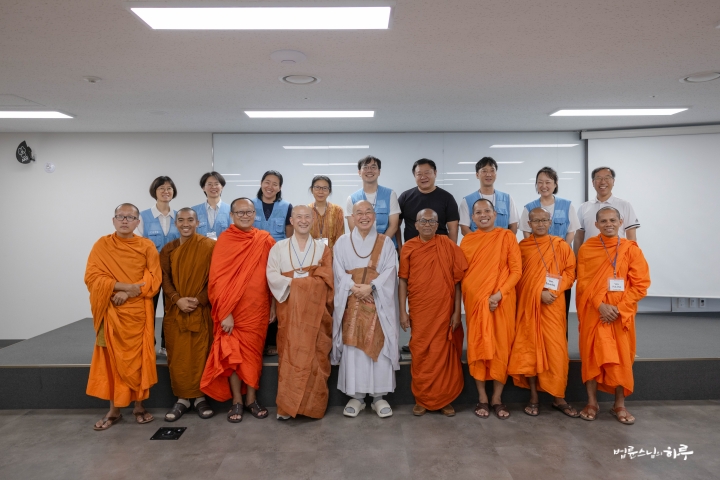
This concluded the 10-day INEB Study Tour program. Everyone moved to the basement dining hall to enjoy snacks and continue their conversations. Afterward, Sunim bid farewell to the INEB participant monks.
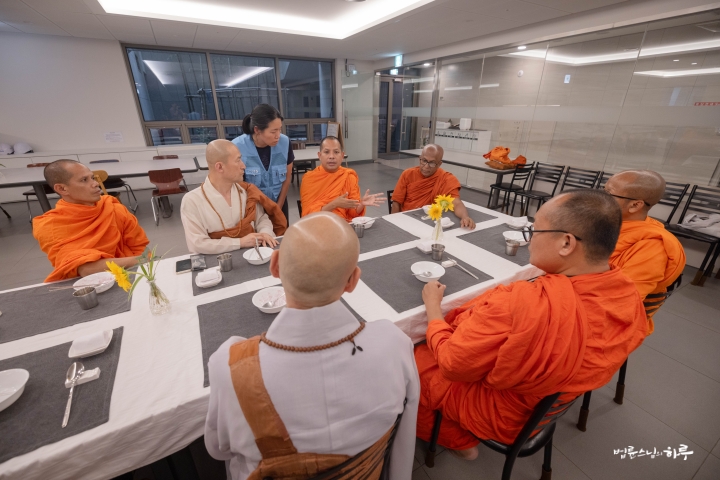
As the sun set, Sunim headed to the broadcast studio at Seoul Jungto Center. At 7:30 PM, he began the Friday Dharma Q&A live broadcast. With about 3,900 people connected to the live stream, Sunim gave his opening remarks.

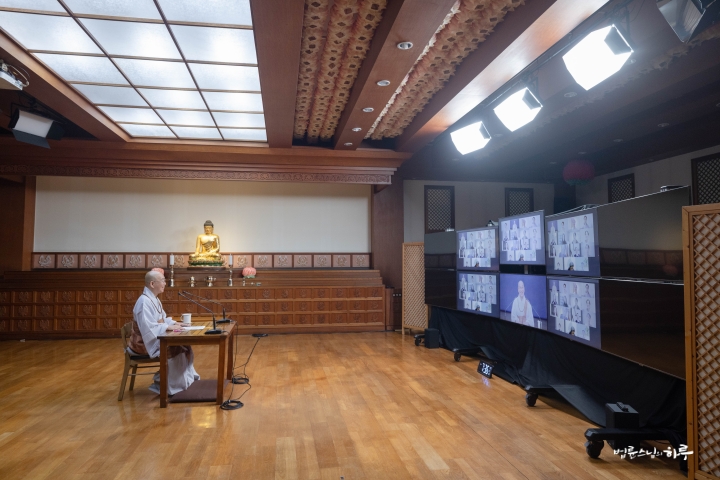
“This year, 2025, marks the 80th anniversary of Korea’s liberation. It has already been 80 years since we regained our country after losing it to Japan and suffering all kinds of hardships. During this time, we experienced extreme poverty and suffering, but now our country has joined the ranks of developed nations, with Korean products and Korean Wave culture sweeping the world. It truly has been a transformation as dramatic as ‘turning mulberry fields into blue seas'(桑田碧海). However, despite these material achievements, when we investigate whether Koreans are actually happy, the results show they are not. According to OECD statistics, our country has the highest suicide rate and the lowest birth rate. In other words, our happiness index is very low. A high suicide rate means life is difficult now, and a low birth rate means young people don’t feel hopeful about the future. While foreigners looking from the outside see Korea as a wonderful place to live, we who actually live here are crying out that it’s ‘difficult’ and ‘painful.’ Of course, we need to further develop democracy and expand equality indices and social security systems. However, statistics prove that these things alone cannot make us happy.
Koreans have quick tempers and easily get angry, are greedy, and stubborn, resulting in a very high social conflict index. These factors can be seen as lowering our happiness levels. That’s why Dharma Q&A is not just about resolving individual difficulties but can also be seen as a movement to increase the happiness of all Korean citizens. We conduct Dharma Q&A with the intention of helping people manage their minds well and increasing the happiness of the Korean people. Now, let’s examine what’s causing your suffering today and whether it’s really the cause of your suffering.”
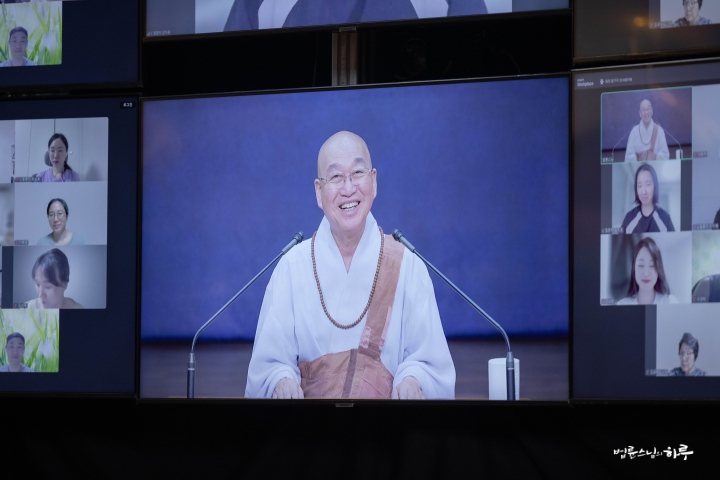
Next, people who had pre-registered their questions took turns asking Sunim. Four people had conversations with Sunim during the hour. One of them sought Sunim’s advice on how to overcome the loneliness and emptiness after leaving a cult.
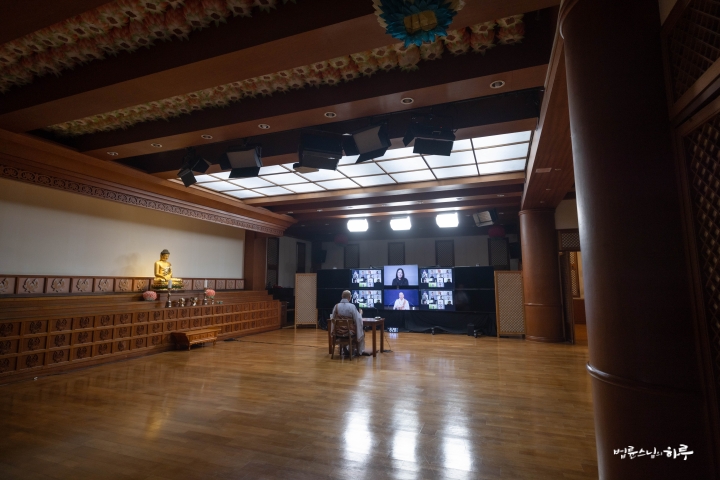
I Feel Self-Loathing for Wasting 12 Years in a Cult

“From what you’ve told me, it doesn’t sound like it was a cult. When you were there, you had clear life goals, but now you don’t. Wouldn’t it have been better when you had clear goals? (laughs)
What you’re thinking now is similar to saying, ‘I spent 10 years doing drugs and got through each day well, but after quitting drugs, each day is so boring and I have nothing to do.’ Was it good to quit drugs after 10 years, or was it wrong to quit because the emptiness is so great?”
“It was good to quit.”
“If you left a cult after 12 years, isn’t that better than leaving after 20 or 30 years?”
“It’s better.”
“Then you did well. If you fell while walking down the road, is it better to get up or stay sitting?”
“It’s better to get up.”
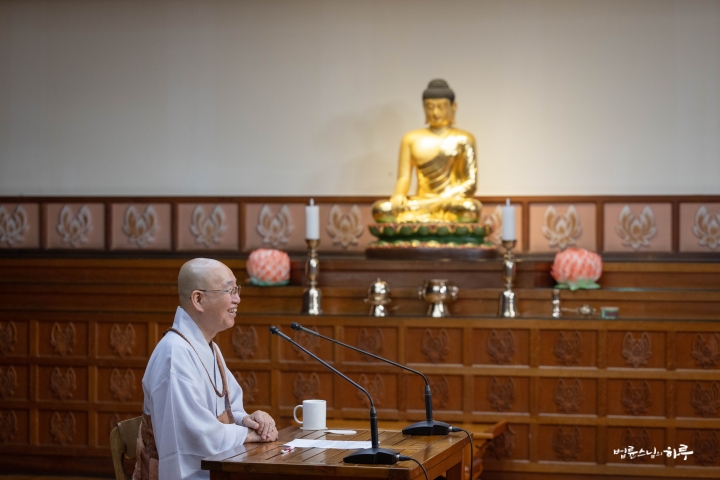
“But right now, you’re only thinking, ‘How nice it would have been if I hadn’t fallen.’ Of course, it would have been nice not to fall. But since you’ve already fallen, it’s better to get up now. What you need to do now is get up and continue walking. Someone who has fallen once knows when and under what circumstances they fell, so they can be more careful in the future. But someone who hasn’t fallen yet doesn’t have that experience, so they’re actually more likely to fall in the future. From that perspective, when a similar situation arises again, you can be more careful than someone who has never been in a cult. When you feel lonely and empty and someone approaches you suggesting to join them, you won’t be easily tempted. For example, even if you see an advertisement for Happiness School, you won’t just join immediately. You’ll first research what Happiness School is and who Venerable Pomnyun Sunim is before making a decision.
Right now, those 12 years might seem like a loss, but you experienced this in your twenties. It’s better than experiencing this in your fifties. Looking back, those 12 years won’t be a big deal. For example, if you repeat a year after high school graduation, it feels like a huge difference when your friends are in college while you’re studying for entrance exams, but after 10 years, it doesn’t matter whether you repeated once or twice. Your 12-year experience is the same. So please don’t dwell too much on what has already passed.
There’s no such thing as a cult originally. There are only organizations that commit crimes by exploiting people’s faith. For example, sexual harassment, sexual assault, or extorting money isn’t a cult – it’s a crime. The word ‘cult’ simply means deviating from mainstream religion. From Judaism’s perspective, Christianity is a cult, and from Catholicism’s perspective, Protestantism is a cult. Whether something is a cult or not can change depending on the era and perspective. What’s important isn’t whether it’s a cult or not, but whether crimes were committed. Using religion to commit crimes is clearly wrong. Do you perhaps have any desire to go back there?”
“No, I’ve completely given up on that.”
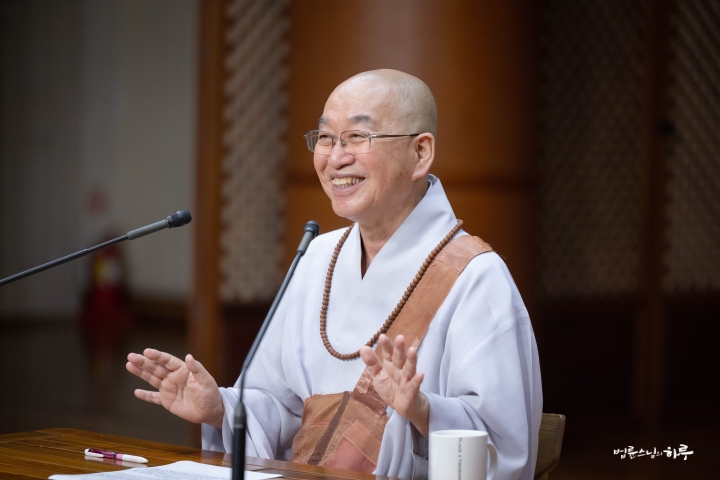
“If you make good use of this experience, it could actually help your life. In the future, not just with religion but in similar situations, you’ll be less likely to be deceived than others. For example, even if you receive phone calls or messages saying ‘You can make money by investing with me,’ you won’t be easily fooled like before and will check once more. Rather than regretting the past 12 years, you should have the perspective that ‘I fell, but I can get up and continue.’ Right now, you were too focused on one thing and suddenly let go, so you’re in a dazed and empty state not knowing what to do immediately. But after just one year, it will naturally be filled. Don’t worry. Are you currently looking for a job?”
“Yes. I’m currently looking for a job.”
“Good. When you start working, you’ll form new relationships and make friends. However, if you rush to fill the current emptiness quickly, you might fall into something strange again. Falling into something means your heart feels empty. When you lack money and someone offers you money, you might be tempted, and if you feel empty about romance, it’s easy to fall for someone who approaches using that as bait. So when meeting people, you should have the perspective of ‘I need to be careful’ while forming relationships with new people at work, and also build relationships while following a healthy and recognized religion. By doing so, your current emptiness will naturally be filled. After about a year, you’ll be fine. Please don’t rush too much.”
“Thank you. After listening to your words, I feel like I really need to start a new life now. I’ll work and build good relationships with new people.”
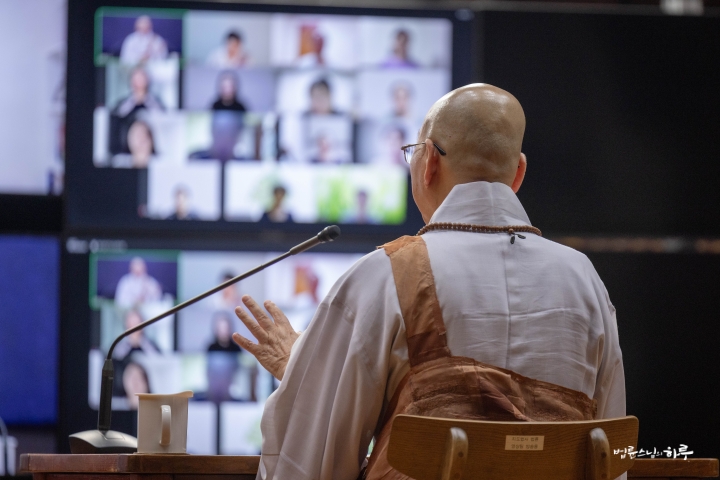
“However, even after quitting drugs, many people can’t overcome the emptiness and return to them later. Some people never do it again because they’ve experienced it, but others are more likely to fall back because they’ve experienced it. You might feel fine now, but if you can’t overcome the emptiness and void, there’s a risk of falling back there. So what’s important is to quickly recover your daily life. You need to find a job, make new friends, and spend each day without feeling empty to avoid going back. It’s important to gradually create your own life in daily life.”
Questions continued to follow.
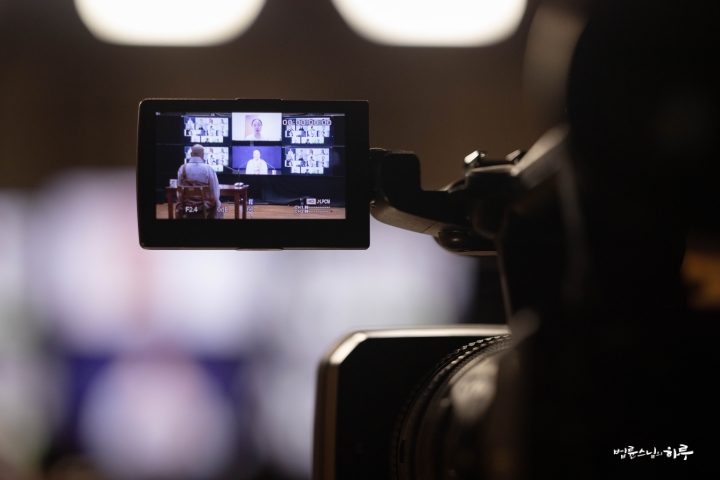
As a mother with a young baby, should I prioritize returning to work or childcare?
What should I do between my sister with disabilities and my indifferent mother?
How can I resolve conflicts with my mother who keeps demanding money during wedding preparations?
After finishing the conversations, it was past 9 PM. The live broadcast ended with the promise to meet again at the same time next week.
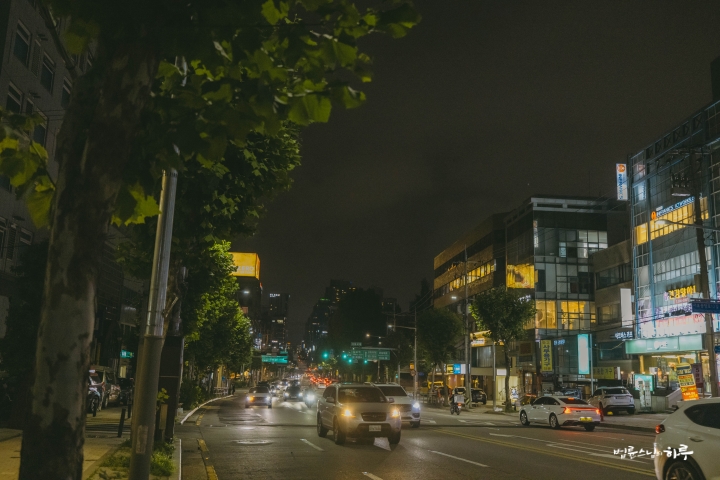
Tomorrow morning, Sunim will have a meeting with INEB Secretary-General Moo to discuss how to cooperate and collaborate with various organizations in Southeast Asian countries. In the afternoon, he will move to Dubuk Jungto Retreat Center and continue meetings with Moo in the evening.





